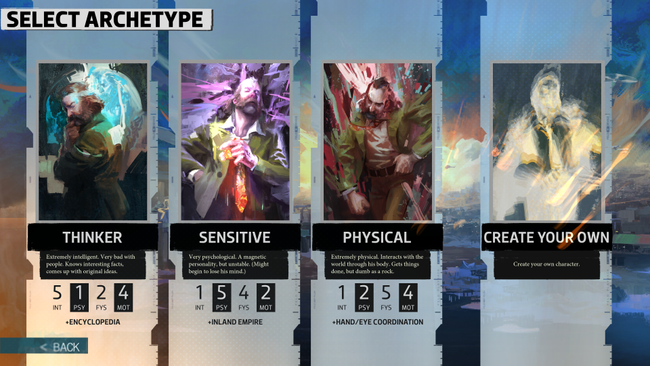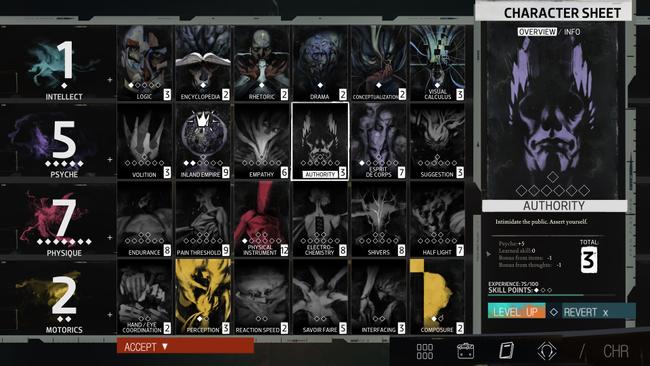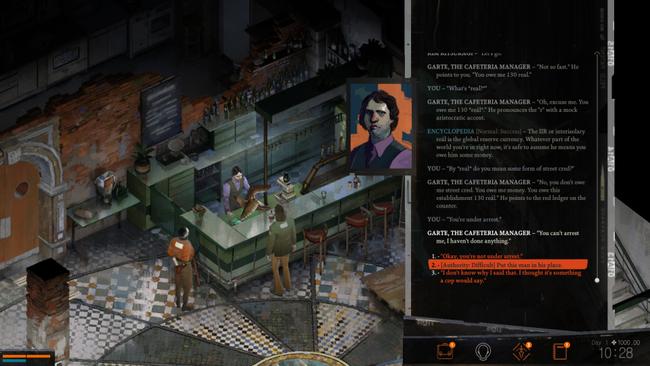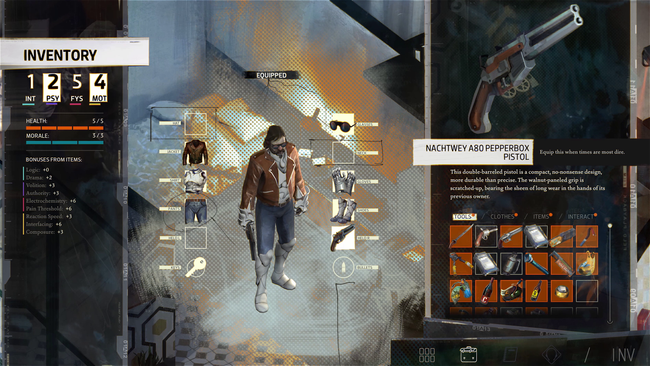
Disco Elysium- The Final Cut Review
I walked away from Disco Elysium- The Final Cut with many of the same feelings I had from playing Hades last year. I went into both games with high expectations built on all the good I'd heard, but came away with those expectations surpassed in every way. Both have changed how I approach gaming, but I'd argue Disco Elysium has changed my viewpoint even more.
It’s made me look differently at story-telling and the importance of writing, how vital gameplay is to an experience, and how indie games can stick with you just as much as the big-budget blockbusters, perhaps even more so. Not only is Disco Elysium one of the best games I've played this year, it's also one of the best I've played full stop. To put it simply, Disco Elysium is a masterclass in story-telling, and now that the game's initial launch bugginess has been ironed out, it's an absolute must-play.
Disco Elysium - The Final Cut is an extended version of the original 2019 release, introducing voice-acting to every line in the game, adding some new politically charged quests, and bringing it to home consoles for the first time. As a console player myself, I never got the chance to play Disco Elysium the first time around, but it was always the one game that nearly convinced me to give PC gaming a go. The incredible word of mouth is a big reason for that, but the murder-mystery focus and player choice really caught my eye from the start, I've been incredibly excited to give it a go ever since it was announced that it would be coming to consoles.
You play as a disco-suited detective waking up with the world's worst hangover, one that has literally erased his memory and left him an amnesiac mess in the middle of trying to solve a suspected murder case. From there, it's up to you to piece your identity together and solve the murder with your new partner Kim Kitsuragi. Solving this mystery all takes place while deciding exactly what sort of police officer you want to be and interacting with the varied characters of Revachol.

Disco Elysium is primarily presented as a murder mystery, and it works quite fittingly as one, although the murder itself is arguably not the real reason why the story works so well. It's well put together, but the conclusion of the narrative feels like a purposeful thematic misdirect that makes subsequent playthroughs all the more interesting. You can absolutely find little hints along the way cluing you in as to what Disco Elysium is all about, and in many ways, it feels like the game is smartly telling the player to focus on the people and world of Revachol. Talking about these things too much would be diving into spoiler territory, but there's so much more going on in the world of Disco Elysium than murder mysteries, and it's something that I became very fond of after my initial playthrough.
The real hook here is the world, the characters, and the writing, all of which are on another level to any other game I've experienced. Revachol is described in such intimate detail and given such character that it truly feels like a real place, with real people, and real history. I'm not the sort of player who likes to know everything about a game's world, but the way it's presented in-game is really captivating. I probably know more about the history of Revachol than I do of my own hometown, which is probably a bit worrying. What makes this all the more impressive is that the map itself isn't actually that big, and is instead just incredibly concentrated and detailed. You'll learn it like the back of your hand by the end of your first playthrough, and there's something very cosy about walking its streets, even if if it's not the happiest of locations.
As great as the world-building is, the characters are a huge part of why the story works so well, and I'm confident in saying that there isn't a single weak link in the game's cast. Even the most unlikeable characters, like Titus and Cuno, have their emotional sides, and everyone feels incredibly human. Every conversation you have with another character is immediately gripping, and it is unarguably one of the game's biggest strengths.
Kim, in particular, is a delight, and I found myself surprised at just how many times my actions would depend on whether Kim would approve or not, which is when you know you've developed your characters well. Some of my favourite moments in the game simply have you and Kim doing something outwardly inconsequential to the storyline, developing a relationship. Now I'm thinking about it, I don't think a single one of my favourite moments doesn’t have Kim in it. Whether it be sharing a stolen sandwich for camaraderie, seeing who can nod at a wall, or dancing as hard as possible in a church-turned-nightclub, there are countless moments that make the bond between the two characters feel real.
I've previously looked at games like The Last of Us, Final Fantasy VII Remake, and The Witcher 3 as prime examples of good characterisation and that still holds true, but I think my new benchmark is Disco Elysium. It's that well done.

Disco Elysium's other storytelling ace is its writing, especially its descriptive text and prose. There are so many amazing examples of well-written prose in the script that I couldn't help but screenshot game text from the moment I started playing. The conversations read like actual conversations, the people emote like actual people, and the descriptions of the environment and what is happening in it are presented like literature. All of the game is presented through your detective's thoughts, so it feels incredibly human and genuine.
It sounds pretentious, but Disco Elysium is the first game I've played that I truly think could be considered as literature and the first where I never wanted to skip a single line. Before I decided to get into gaming journalism, one of my favourite things in the world to do was read a good book, but it's something I've had less and less time to do as I focused on writing. In a lot of ways, it felt like Disco Elysium combined two of my passions and put them into one, which is possibly one of the reasons why I'm so fond of it.
One thing I really appreciated about the storytelling on offer here is how well it handles tone. There are many moments of sadness, depravity, and thoughtfulness, but there are just as many light-hearted and legitimately funny ones too. Two scenes, in particular, had me belly-laughing at the screen, whilst others had me gasping and slack-jawed, which really speaks to how invested I was in the story.
This brings us to The Final Cut's biggest new addition - the voice acting. Not only are all of the characters fully voiced, but so is every single line of prose, and the actors all do a fantastic job. I genuinely couldn't imagine playing through the game without it now, and it does make this feel like the "final cut". My first playthrough was a little bit marred by bugs, but the voice acting still made it feel like waiting for the Final Cut was one-hundred-percent worthwhile.
Before Disco Elysium released, I was pretty certain that I'd love the story and characters, but I was admittedly a bit nervous about how the game actually plays. It was clear from the outset that this isn't the sort of game I typically play. The inclusion of dice rolls, success percentages, and the Thought Cabinet all left me a little intimidated. Thankfully, the story isn't the only element of the game I loved, as its mechanics are all really fun to play around with, and are surprisingly welcoming once you get into the game. I even did another playthrough of the game on the hardest difficulty, whilst also setting a personal challenge of never checking the body for clues, which is a level of dedication I rarely have for any game.
The first thing you do when starting out Disco Elysium is choose an archetype for your character. Here you'll decide how many points you want to put into the four elements that make up your character, which will then affect the sorts of things you can do in the game. If you want to be good at deducing things and examining crime scenes, you'll want to put points into intellect, whereas if you want to get the most out of interacting with people you'll want to allocate points to psyche. From there, you'll also be able to put points into specific areas such as logic or suggestion. If it sounds too complicated, you can also just choose between three different pre-made archetypes, but a huge part of Disco's fun is making your character whoever you want them to be.

Your detective, who I won't name here for spoiler purposes, is completely malleable and is endlessly entertaining throughout because of it. My first playthrough had me playing a straight-laced, emphatic cop who wanted to help everyone he saw, whilst my second playthrough had me as a drink-guzzling super-star cop who was more interested in rushing to the end no matter how angry it made Kim. I'm sure future playthroughs will be just as varied, and the fact that I'm already thinking about it should say the depth of the system. Your character always feels like he has a detailed personality, no matter what you decide that personality to be.
Even better than just being able to mold your detective is the fact that each personality trait will actually voice their opinions on things you come across as you play, such as Empathy chiming in when talking to people, or Esprit de Corps chiming in when something police-related is going on. The way the game plays with these personalized traits is one of its most fascinating elements of Disco Elysium and really drew me to replaying it with so many different variables.
A good example of how well this system is handled is one conversation early on that has several personality traits talking to each other at once as they realise they've been compromised and cannot be trusted to handle the situation they're in. It's one of the only times something like that happens in the game, and like everything else in Disco Elysium, it's incredibly human. Spine-chilling stuff.
As Adam noted in his original review of the game, Disco Elysium really is a game all about talking with people, perhaps even more so now that everything in the game is voiced. There are very few instances of violence, and instead, your detective explores the environment, inspects objects, and talks to people to get answers. This is where all of your character creation choices come in. Some dialogue choices will have success checks next to them that require a roll of the dice to succeed in, and how many points you've put into certain skills will affect your chance of success.
This applies to non-dialogue scenarios too, such as having to knock down a door or make a difficult jump, which will be affected by physical skills. All of this may sound daunting, but it's very similar to dialogue checks in games like Fallout, but with dice playing a role as well as percentages. Personally, I never really worried too much about the rolling of the dice, as Disco Elysium is actually just as fun by letting yourself fail. Although there are game over screens and you can die in many different ways, you'll never see a lose state no matter what skill checks you fail, and instead you just have to figure out another way to proceed.
You are constantly being given tasks to complete, which will reward you with experience points you can use to upgrade your skills, or you can alternatively change your clothes, or drink and use drugs to get temporary boosts to your attributes. All of this is to say that you are never put in a situation you can't get yourself out of, no matter what choices you make, and that just inspires more risks and creativity. Playing through the game on hardcore mode makes these skill checks even more challenging, and I'd highly recommend it for anyone wanting to get the most out of the mechanics.

You'll also be shaping who your character is simply by how you choose to interact with people, which the game will keep track of, and even allow you to focus on if you process it in the thought cabinet. My first playthrough started me off as a "Sorry Cop" after noticing how much I was apologising for my actions, but the second playthrough I went the opposite way and was labelled a "Superstar Cop", complete with the option to add gun fingers to particularly cool sentences (which I did). There are so many variations and options within the game that it can honestly be a little mind-boggling at times.
All of this may sound complicated, but once you've played the first hour or two you'll figure out how the game works. You'll find a ton of variety in player choice that lets each Disco Elysium playthrough feel incredibly different, even if the mystery remains the same throughout. I've played through the game three times now, and I'm certain I've still missed a ton of conversations and content in the game. What's amazing to me is that, at its core, all you're really doing is walking from location to location, talking to whoever is around, and trying to pass all of the dialogue checks, but it works so well because that's where the game is focused.
The only real complaint I can make about the gameplay is that there's a fair amount of backtracking involved. As mentioned before the map isn't very big, but it can still be annoying having to wander from one end to the other, and using the fast-travel system can result in some annoyingly frequent loading times on PlayStation 5. I love Disco Elysium's art style, but it's not exactly taxing so I do wish the game performed a little bit better.
These are nowhere near deal-breakers, but if you play the game more than once you might get a bit too used to dead air between major events. Even then, there are tons of small details that you only notice on subsequent playthroughs, so I was still always spotting new things. The fact that I only have one minor issue with how the game plays should be telling of its quality.

When planning this review and during my first playthrough, my biggest complaint about Disco Elysium was originally its glitchiness and poor launch state. There were progress-halting glitches, crashes, graphical oddities, missing audio, and just a general lack of polish that meant recommending Disco Elysium - The Final Cut was a big ask. Thankfully, the latest patch for the game has managed to remove pretty much all of the major issues in the game, which has improved things a ton. I know, because I instantly started going through the game again with a different character archetype, and all of the issues I'd ran into before had gone.
From my experience, there aren't any progression-based bugs anymore, item interactions have been fixed, and the audio issues have been stamped out entirely, which were all things I had issues with in my initial playthrough. Before the most recent patches, I was having a hard time recommending The Final Cut,, but now I am confident that most of the issues have been polished up, and it is absolutely worth going for. There are still some oddities and things that need to be updated (the font size for menu items is still ridiculously small for example), but it's a marked improvement over how the game launched and is absolutely playable from start to finish now. Even the smooth car texture has been fixed!
The fact that Disco Elysium - The Final Cut is now in a good state makes me incredibly happy because it means I can scream from the rooftops how much I want people to play this game. Not only did its gameplay mechanics surprise me with just how much variety they offer, and how much fun they are to mess around with, but its world, story, and characters are second to none in the world of gaming. I haven't stopped thinking about Disco Elysium since I put it down, and I am very excited to go back to Revachol and craft my detective's identity all over again.